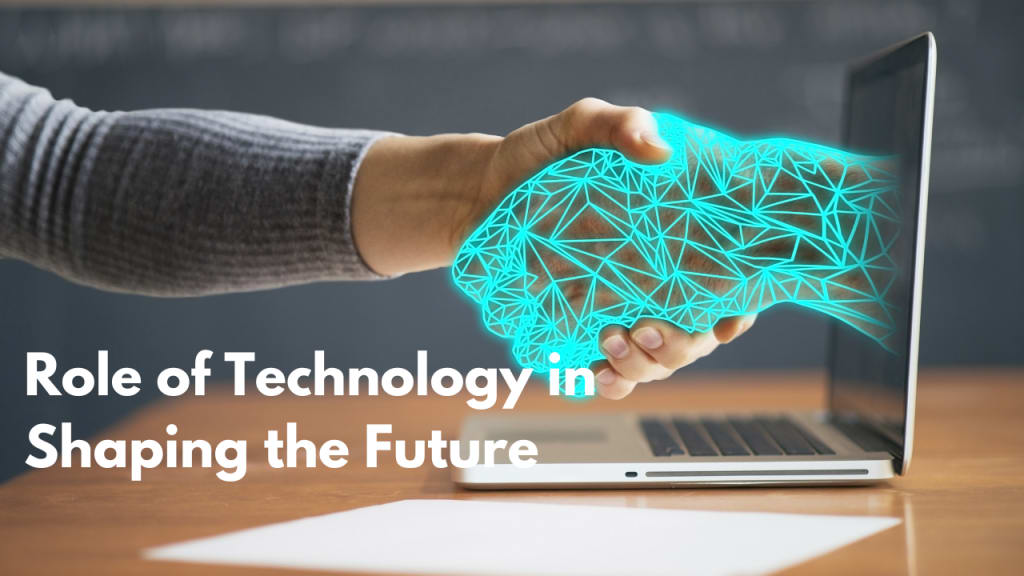
Technology plays a crucial role in shaping our future in various aspects of life, including economy, education, healthcare, communication, and the environment. It has the potential to transform societies, improve living standards, and address global challenges.Technology plays an increasingly vital and transformative role in shaping the future of our society. In the realm of economy, technological advancements such as automation, artificial intelligence, and robotics are revolutionizing industries and disrupting traditional business models. These innovations lead to increased productivity, streamlined processes, and economic growth. E-commerce platforms and digital payment systems have transformed the way we shop and conduct financial transactions, making them more convenient and accessible.
And it will continue to do so in the years to come. From the invention of the wheel to the development of the internet, technology has been a driving force behind human progress. Today, we are witnessing an unprecedented pace of technological advancement, with breakthroughs in fields such as artificial intelligence, robotics, biotechnology, and nanotechnology.
Education is another sector greatly influenced by technology. The advent of online learning platforms, educational apps, and digital resources has democratized access to knowledge and personalized learning experiences. Students can now access educational materials from anywhere in the world, engage in interactive and immersive learning through virtual reality and augmented reality technologies, and benefit from data-driven insights that optimize their educational journey. Technology has also opened up opportunities for remote learning, skill development, and lifelong education, empowering individuals to acquire new knowledge and competencies throughout their lives.
In the field of healthcare, technology has brought about significant advancements. Electronic health records enable the efficient management and sharing of patient information, improving the quality of care and reducing errors. Telemedicine has revolutionized healthcare access, allowing patients to receive remote consultations and monitoring, especially in underserved areas. Artificial intelligence and machine learning algorithms are being applied to vast amounts of medical data, aiding in early disease detection, personalized medicine, and drug discovery. These technological innovations have the potential to enhance patient outcomes, increase efficiency, and ultimately save lives.
Technology has revolutionized communication and connectivity. The widespread adoption of smartphones, social media platforms, and messaging apps has transformed the way we communicate, connect, and share information. Communication has become instantaneous and global, breaking down barriers of time and distance. The Internet of Things (IoT) has connected devices, enabling seamless communication and automation between them. This interconnectedness has led to advancements in various areas, including smart homes, smart cities, and smart transportation systems. It has also facilitated the exchange of ideas, collaboration, and innovation on a global scale.
Environmental sustainability is another crucial area where technology is shaping our future. With the rise of renewable energy technologies such as solar and wind power, we are reducing our reliance on fossil fuels and mitigating the impact of climate change. Advancements in energy storage, smart grids, and energy management systems are optimizing energy distribution and consumption. Technology is also enabling advanced monitoring systems, data analytics, and predictive modelling to address environmental challenges and promote resource conservation, waste reduction, and sustainable practices.

However, as technology continues to evolve, it brings forth ethical and social implications that need careful consideration. Issues such as data privacy, cybersecurity, algorithmic bias, and job displacement require ongoing attention and regulation. It is crucial to ensure that technology is developed and used in a way that benefits all of society, respects individual rights, and minimizes harm. Through responsible innovation, collaboration between stakeholders, and thoughtful governance, we can harness the potential of technology to create a future that is inclusive, sustainable, and beneficial for all.
One of the most significant impacts of technology on our future is the way it is transforming the way we live, work, and communicate. With the rise of the internet and social media, we are more connected than ever before, and we have access to an endless stream of information and entertainment. This has led to the democratization of knowledge and the creation of new opportunities for people around the world.
Another way technology is shaping our future is through its impact on the economy. The rise of automation and artificial intelligence is changing the nature of work, with many jobs being replaced by machines. While this may lead to job losses in some sectors, it also presents new opportunities for innovation and entrepreneurship. In addition, technology is driving the growth of new industries, such as renewable energy, electric vehicles, and biotechnology, which have the potential to create millions of new jobs.
Technology is also transforming the way we address some of the world's most pressing challenges, such as climate change, poverty, and disease. For example, advances in renewable energy and energy storage are making it possible to transition to a low-carbon economy, while new technologies in healthcare are improving our ability to diagnose and treat diseases.
However, technology also presents significant challenges and risks. The rise of artificial intelligence and automation raises concerns about job displacement and income inequality, while the proliferation of social media and online platforms has led to the spread of misinformation and the erosion of privacy. In addition, the development of new technologies such as biotechnology and nanotechnology raise ethical and safety concerns.
In conclusion, technology will continue to play a critical role in shaping our future, and it is up to us to ensure that we harness its potential for the greater good while mitigating its risks and challenges. As we move forward, we must remain vigilant and proactive in our approach to technology, ensuring that it serves the needs of all people and contributes to a more just, equitable, and sustainable world.
Best regards,
Buridi Vishnu Kanth
22KD5A0703

ELCSLAB @ Lendi
View Details
You may also like

"Involve Me and I Learn" – The Heart of Effective Teaching
Benjamin Franklin’s timeless wisdom, "Tell me and I forget. Teach me and I remember. Involve me and I learn," serves as a guiding star for educators. In the ever-evolving world of education,

Brilliance vs. Reliability: Which is More Important in the Contemporary World?
Dear Friends,Recently, the famous Hindi actor Sunil Shetty shared a post reflecting on the value of reliability over raw talent or brilliance, drawing from his experiences in the film industry and

LIFE OF AN ADOLESCENT
Who are adolescents?Adolescents are the persons who complete their childhood and enter the world of responsibility. At this age, we will acquire attributes and abilities that will be essential for

The Power of Relationships in Education
In the fast-paced world of education, teachers often find themselves juggling lesson plans, assessments, and administrative tasks. However, amidst the hustle, one fundamental truth remains unchanged: education

All About CUET
🎓 CUET (UG) 2025: Your Ultimate Guide to Undergraduate Admissions in IndiaThe Common University Entrance Test (CUET) UG 2025 is a pivotal examination for students aspiring to pursue undergraduate

Responsible Search
What is India Thinking during Year-End Week (Dec 22 to Dec 28, 2022)? Are You doing a Responsible Search?Dear Friends and StudentsYesterday I got this question while I was walking. What is India

Shaping the Guardians of the Nation
The National Defence Academy (NDA) stands as a testament to India's commitment to producing world-class military leaders. Located in Khadakwasla, Pune, NDA is the first tri-service academy in the world,

Stream Selection @ 10th Grade For A Successful Career
STREAM SELECTION @ 10TH GRADE FOR A SUCCESSFUL CAREER10th Standard is a defining moment for every Indian student. Once the Board exams are over, every student needs to decide on selecting a stream

Architecture After JEE Main Paper 2: Careers Beyond Buildings
JEE Main Paper 2 is the primary gateway for students aiming to pursue B.Arch (Bachelor of Architecture) or B.Plan (Bachelor of Planning). While most aspirants are familiar with the conventional image of

Electrical and Electronics Engineering
What is EEE? Is an academic program that deals with Electrical and Electronics Engineering. It was one of the most sought-after courses amongst engineering students. Presently it is

Will AI becomes Obsolete soon?
While the world is grappling with AI, Scientists are Working on OI ! Will AI becomes Obsolete soon?Dear FriendsIn 2018, when we started skill2030.com (AI-Powered Metaverse Based Interview Automation

Careers for the Bold and Curious
Every year, lakhs of students across India appear for the JEE (Joint Entrance Examination) and NEET (National Eligibility cum Entrance Test), aspiring to secure seats in premier institutions like IITs











